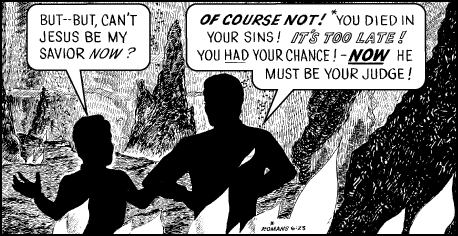“Pope Benedict ‘closed’ Limbo and no one complained,” Thomas Reese writes for RNS. (That column is from last month, but then the doctrinal change he’s discussing took place back in 2007.)
Reese’s main point is less about the specifics of this now former doctrine and more about the way that people who build their identity as conservative won’t blink when even major changes are made by someone they regard as a fellow member of Team Conservative.

“Many conservative Catholics are upset with Pope Francis, who they complain is changing church doctrine,” Reese writes, “but they hardly blinked when Pope Benedict got rid of Limbo, a Catholic doctrine that had been taught for centuries.”
What Pope Benedict did was the greatest change in church teaching since the Second Vatican Council. …
If it had been Pope Francis who questioned Limbo, he would have been condemned by conservatives for challenging church dogma. Benedict could get away with it because accusing him of unorthodoxy would have gone against stereotypes, akin to President Richard Nixon going to China.*
I enjoyed Reese’s discussion of these intramural Catholic issues, but that’s his household, not mine. What interests me more here is the no-longer-a-doctrine of Limbo itself.
Limbo was always an awkward and obvious patch-job. The idea developed alongside the disturbing, weird idea of a literal “Hell” of eternal, conscious torment. It was a necessary complement and correction to that idea — one required to make “Hell” seem possible or acceptable and not, as it otherwise would be, a blasphemous accusation slurring God as monstrously evil.
Reese summarizes the main thrust of the problem that “Limbo” was invented to fix:
Limbo was a theological solution to the problem of what happens to good but unbaptized people after they die. The New Testament is full of passages that say baptism is necessary for salvation. Catholic teaching said baptism was necessary to wash away original sin, which we inherited from Adam and Eve.
But sending unbaptized infants to hell seemed especially cruel. How could God, who is described as merciful and loving in the parable of the prodigal son, do such a thing?
We need to remember that for the ancients, hell or Hades was the underworld, the place of the dead. Thus, in the creed when we say Jesus “descended into hell,” we are not speaking of the place of eternal damnation but the domain of the dead. No church father before Augustine thought unbaptized children would be punished.
St. Augustine, however, believed unbaptized children would experience the misery of the damned but be consigned to the mildest part of hell. Augustine was such a theological giant that there was reluctance to question his teaching, especially when all theologians at the time were men without children.
It took several centuries for the folklore of “Hell” to become doctrine, after which theologians began scrambling for something like Limbo to avoid portraying God as, well, superlatively evil. The idea of Limbo arrived at the same time as those monstrous ideas of eternal conscious torment in “Hell.” It evolved over time from a kind of Hell-lite on the outskirts of Hell proper to eventually become a separate realm of the Afterlife. By the time it was given the name “Limbo,”** it had gone from being “the mildest part of Hell” to a kind of Edenic earthly paradise.
Frankly, compared to the usual ethereally bland descriptions of Heaven, Limbo sounded like a sweet deal. An eternity in an earthly paradise hanging out with the Hebrew prophets, Socrates, Einstein, and Gandhi? What’s not to like?***
But one problem with Limbo — apart from the obvious We Just Made This Up aspect of it — still persisted. Yes, it was much better to tell grieving parents that their unbaptized infant was “in Limbo” than to tell them that God was torturing that infant for all of eternity, but this still entailed an eternal separation. As Reese says, Benedict’s demotion/erasure of Limbo thus involved a vast improvement in the pastoral care of such parents: “While mourning their dead infants, parents can now rest assured that their unbaptized children have gone to heaven.”
And it doesn’t just help with the pastoral care of parents mourning a lost infant. Pastoral care across the board gets better. It’s easier to offer comfort, solace, and grace if those are divine attributes. (And, conversely, it’s much harder to have anything helpful to say at the side of a hospital bed or a grave if you think God is some kind of cosmic asshole who gets off on tormenting infants for eternity and calls that “holiness.”)
That pastoral concern was part of the reason the invention of Limbo was necessary following the invention of Hell. Hell also made the invention of Limbo apologetically and ethically necessary.
Here I’ll just focus on the latter of those because it’s the important one. (Get the ethics right and you don’t need to worry about the apologetics. Get the ethics wrong and no amount of perfect apologetics will be convincing.)
Whatever it is we teach that God is like carries with it the implication that this is what we ought to be like. If we believe that God’s character is, as Jonah complained, “gracious and compassionate, slow to anger and abounding in love,” then we will inevitably also believe that we are supposed to also be “gracious and compassionate, slow to anger and abounding in love.” If we believe that God is perfectly cool with billions of infants suffering torment, forever and ever, because of the doctrine of original sin, then we will inevitably become or attempt to become people who are also perfectly cool with that.
The real problem here — ethically, apologetically, and in terms of pastoral care — is not Limbo, but the slightly earlier, equally We-Just-Made-This-Up invention of “Hell.” Now that Benedict has discarded the clumsy patch created to cover up that abominable mistake, here’s hoping that bit of folklore disguised as doctrine is the next to go.
* Reese reminds us there of the strange and unflattering meaning behind that now-cliché reference of Nixon going to China. The aphorism is usually stated as something like “Only Nixon could go to China.” Meaning that only someone like Richard Nixon could get away with going to China without being brutally criticized for doing so and thus getting branded as a weak appeaser who was soft on Communism. The first use of the phrase in print — from an interview with Democratic Sen. Mike Mansfield — was “Only a Republican, perhaps only a Nixon, could have made this break and gotten away with it.”
The “gotten away with it” part is the key there. What Mansfield was saying — and what every repetition of the cliché reiterates — is that the same Cold Warriors then praising Nixon for meeting with Chairman Mao would have mercilessly attacked anyone outside of their tribe who had done the same thing. And please understand: If anyone other than Richard Nixon had attempted to do what Nixon himself did, then Richard Nixon himself would have attacked that person as a weak appeaser who was soft on Communism.
“Only Nixon could go to China,” in other words, is a confession that we often do not judge words or actions according to their substance, but according to our perception of the speaker or actor. If that person is perceived as someone whose allegiance lies with Our Side, then the words or actions are praised, even if they are things we would criticize coming from anyone who is not on Our Side. But if that person is perceived as someone whose allegiance lies with Their Side, then the words or actions are condemned, regardless of whether or not they might be wise, practical, good, beautiful, or true.
“Only Nixon could go to China” is the admission that we humans value allegiance more than truth, wisdom, effectiveness, or morality.
** The name “Limbo,” Reese notes, comes “from the Latin ‘limbus,’ meaning edge or boundary.” There probably isn’t an etymological connection to the Trinidadian dance also called “Limbo,” which likely gets its name from “limba” or “limber,” the quality the dance requires and rewards.
*** The infant-dominated demographics of Limbo might’ve been a challenge.
Me: Wow, you’re Socrates! This place is great!
Socrates: Hope you’re good at changing diapers.
Me: Wait … what?
Groucho: He’ll learn. Here, new guy, this one’s ripe. (hands me a baby as I realize we’re surrounded by a vast sea of infants)













